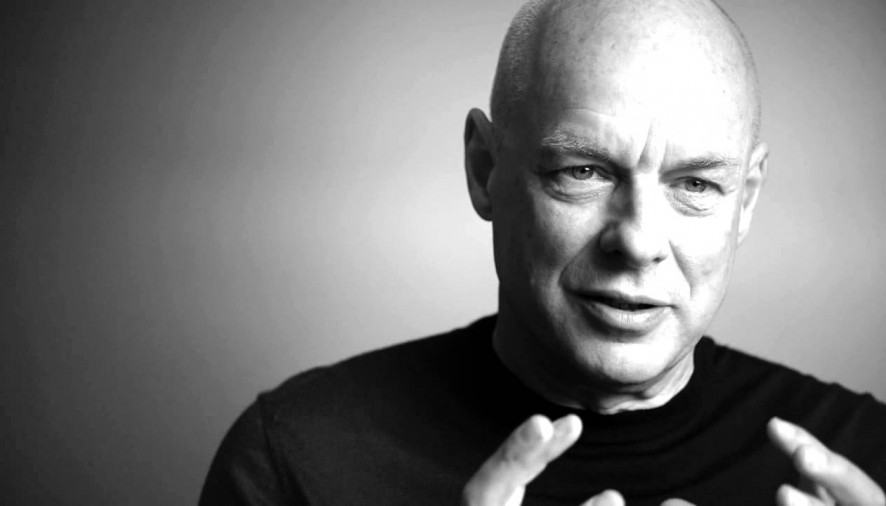The late John Peel spent the majority of his life tirelessly seeking out new musical talent and presenting it to the eager ears of the British public. The celebrated radio DJ is widely remembered for his great musical mind, and awe-inspiring record archive. Last Sunday, BBC Music paid tribute to this legacy with the fifth annual Peel Lecture, held at the British Library. This year the talk was delivered by one of Peel’s own discoveries, and pioneer of ambient music, Brian Eno. Eno spoke of the uniting social force of the creative arts in our “ecology of culture”. What we can learn is that whilst art is not necessary for survival, this does not make it unnecessary.
Despite being a revered and respected figure, Eno’s soft and unassuming delivery was refreshingly meandering. His words led the audience through a medley of musings on the creative process, fluidly interwoven with personal anecdotes and snippets of social commentary. After highlighting the ambiguity of the term “art”, Eno went on to shape his ideas around his own personal definition of the word: “art is everything that you don’t have to do”. To this end he attributes artistic value to even the most mundane of everyday embellishments, from painting your nails to making a Baked Alaska. At one point, he likened dancing routines to a couple of old ladies on a bus discussing the latest development in their favourite soap. Both, he said, are an attempt to synchronise.
Throughout his career, Eno has synchronised and fused his creative interests. As a self proclaimed, “nonmusician”, Eno’s talents stem from a refusal to tie himself to one specific artistic practice. He represents an inclusive approach to the arts, where training is secondary to imagination. Despite attending Winchester School of Art, Eno never intended to become a visual artist. After graduating in 1969, he began experimenting with tape recorders and synthesizers to manipulate sounds. His unorthodox methods made him a highly influential and desirable figure in British pop culture. Following his years in Roxy Music, Eno went on to produce albums for The Talking Heads and David Bowie, amongst others.
Working with the painter Peter Schmidt in 1975, the pair produced a set of flash cards, intended to inspire fresh approaches to their art. One card read “honour thy error as a hidden intention”. Forty years on this message still rings true. Eno’s Peel Lecture promoted experimentation and openness when thinking about the function of art. Drawing upon personal experiences in the fields of music production and the visual arts, he argued that recognising creativity in all acts and people develops a deeper understanding of how communities unite and thrive. A word Eno coined to describe the talent of a whole group, as opposed to the genius of an individual, is “scenius”. “New ideas are articulated by individuals”, Eno recalls pondering one walk home, “but generated by communities”. It‘s quite the profound thought to have on your daily commute.
Beneath playful ponderings on the artistic value of bed knobs and boob jobs, however, there was a sense of urgency in Eno‘s message. The Roxy Music star reminded the audience of the invaluable role public services play in encouraging the arts in local communities. He also criticised education secretary Nicky Morgan‘s recent drive encouraging students to opt only for STEM subjects – Science, Technology, Engineering and Mathematics. The implication of the acronym STEM, he pointed out, is that the arts are a luxury. By isolating the arts from science and technology, they are presented as frivolous and unnecessary. However, Eno‘s own experimentations with evolving technology in music production should be evidence in itself that the arts are far more fluid that Morgan‘s approach would suggest.
Amidst the rapid changes of the modern world, Eno argued that the synchronising ability of the creative arts is invaluable. “We need ways of keeping in synch, of remaining coherent. And I think that this is what culture is doing for us”. Listening to Eno’s speech, you begin to notice that realisations of Eno’s vision of scenius are on our doorstep. Take Leeds Music Hub in Woodhouse, for example – a perfect example of people using a space to unite a community through music.
At one point, Eno recalled a personal experiment he carried out in which he asked twenty scientists what the purpose of science was. He received a set of results that were generally in agreement with one another. Eno then did the same with art, and received a myriad of responses. This year’s Peel Lecture has likely had a similar effect. The spirit of the ambient genre, where atmosphere overwhelms traditional structure, lives in Eno’s words. Listening to him speak, there are a number of different messages and quotes to be lifted out and mulled over. However, as he moves seamlessly from the political to the playful and abstract, imagination helps to synchronise the nonmusician’s ideas. Eno’s words are important at a time when the arts, and public services, are under threat, and the need to recognise and appreciate scenius is more urgent than ever.
The 2015 Peel Lecture is available to listen to on BBC iPlayer Radio.
Nancy Hughes

